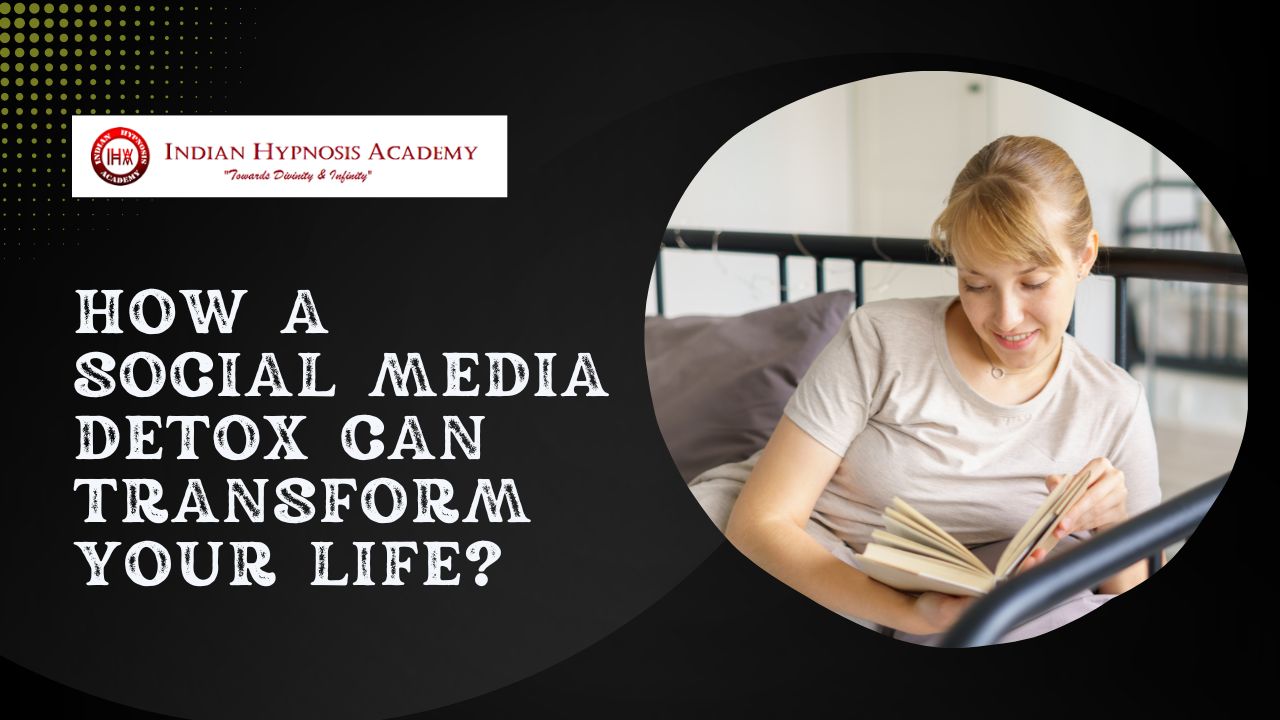Social networking is an essential component of our fast-paced digital life. It allows us to connect with friends, keep informed, and share our lives. Social media has transformed communication and information sharing, but it also has consequences. Social media addiction can harm our mental health. Scrolling, comparing oneself to others, and seeing tailored highlight reels can cause inadequacy, worry, and sadness.
Social media’s addictive nature may take up a lot of our time, leaving little opportunity for real-life experiences and personal growth. A social media detox helps. Social media detoxes are intended to refresh the mind, body, and spirit. Disconnecting from Facebook, Instagram, Twitter, and Snapchat and focusing on offline activities and real contacts is it.
A social media detox is about taking a break to recover control over our digital life. It lets us pause, evaluate, and rebalance our connection with social media so it improves our lives. Social media detoxes have several benefits. First, it lets us focus on our mental health and lessen the stress of comparison. Breaking from highlight reels and filters helps us accept and love ourselves.
Second, social media detoxes boost productivity and attention. Without notifications and interruptions, we can spend time on what matters. The detox helps us rediscover the joy of being present, whether it’s pursuing a hobby, learning a new skill, or spending time with loved ones. A social media detox increases self-awareness and mindfulness. Without the need for external validation, we may focus within and better comprehend our ideas, feelings, and objectives. Self-reflection helps us develop and act more truthfully.
READ ALSO: Avoid Using Phone Just After Waking Up
A social media detox also stimulates real-life connections. Instead of relying on virtual connections, we should focus on building genuine relationships with friends, family, and our immediate surroundings. This creates a sense of belonging, support, and true connection that is absent online. Social media detoxes also improve sleep. Screens’ blue light and exciting material can disturb sleep patterns. Disconnecting from social media, especially before night, improves sleep and regeneration.
In conclusion, a social media detox may change our lives by helping us recover control over our digital habits and reconnect with ourselves and others. Taking a vacation from digital noise improves mental health, productivity, self-awareness, real-life connections, and sleep. We must establish a balance and maintain a healthy connection with social media. Why not try a social media detox and discover its benefits?
1. Understanding Social Media Detox
A. Social media detox definition and Idea
Social media detoxes are intended to refresh the mind, body, and spirit. It entails unplugging from social media and prioritizing offline activities and real relationships. A social media detox helps us regulate our digital habits by taking a break from social media’s noise and diversions.
B. Why social media breaks matter
Mental and emotional well-being: Excessive social media use can cause anxiety, melancholy, and inadequacy. Taking a vacation lets us reassess our connection with social media and minimize the burden of continual comparison.
Productivity and focus: Social media may waste time and derail us. Disconnecting from social media frees up time for meaningful pursuits, improving productivity and attention.
Self-reflection and personal growth: Social media delivers a tailored world, making it easy to lose touch with ourselves. A social media detox lets us reflect on our thoughts, beliefs, and goals. Self-reflection may lead to a more real and satisfying existence.
Real-life connections: Social media may help us build important relationships with individuals around the world, but it can also hamper them. Taking a vacation from social media helps us create closer relationships with friends, family, and our local surroundings, giving us a greater sense of belonging and support.
Sleep and well-being: Constant screen time and social media stimulation can disturb sleep and negatively impair well-being. Social media detox, especially before night, improves sleep and regeneration.
Understanding the concept and advantages of a social media detox helps us realize the need of taking a break from social media and explore its life-changing consequences.
2. The Benefits of a Social Media Detox
A. Mental wellness and stress reduction
- Social media idealizes others’ lifestyles, causing emotions of inadequacy and envy. A social media detox might help us stop comparing and focus on our success.
- Social media usage can cause anxiety and despair. Detaching from the continual flood of information and criticism on social media improves mental health.
- Disconnecting from social media can boost self-esteem that isn’t dependent on likes. This can boost self-confidence.
B. Improved productivity and focus
- Social media may divert our focus from crucial duties. A detox helps us focus and achieve our goals.
- Disconnecting from social media lets our brains roam and explore new ideas. This can inspire creativity and originality.
C. Mindfulness & self-awareness
- A social media detox allows for self-reflection. We may clarify our values, interests, and objectives by removing extraneous influences.
- Disconnecting from social media helps us be present and engage with our environment. This promotes focus and thankfulness for little pleasures.
D. Improved relationships
- Social media links us to many individuals, yet those ties may be superficial. Detoxing from social media lets us focus and nurture important connections.
- Less virtual communication means more face-to-face contact. These relationships build trust, empathy, and community.
E. Better sleep
- Blue light from screens disrupts sleep. Disconnecting from social media, especially before night, improves sleep quality and habits.
- Taking a vacation from digital stimuli helps our thoughts rest and recharge, improving our health and vitality.
Social media detoxes promote mental health, productivity, self-awareness, real-life connections, and sleep. We can recover our time, focus on what counts, and improve our relationship with technology.
3. How to Conduct a Social Media Detox
A. Define objectives
- Define your social media detox goals. Is it stress reduction, productivity, or mental health? Define your detox objectives to keep motivated.
- Choose a detox length—a few days, a week, or a month. Setting a deadline can help you keep to your detox strategy.
B. Plan a gradual detox
- If quitting social media seems daunting, start small. Start by limiting or scheduling social media use.
- Limit social media use to certain times or places. You can avoid social media during meals, bedtime, and mornings.
- Unfollow negative accounts. Mute alerts to reduce distractions and social media checking.
C. Use useful applications and tools
- Limit social media use using applications or features on your smartphone. These tools let you monitor your digital habits.
- Block social media using applications or browser extensions. This prevents mindless social media checking.
D. Do something else
- Use your time on social media for hobbies and interests. Exercise, read, meditate, or try new things.
- Walk, hike, or do other outdoor activities. Nature calms and improves well-being.
E. Ask loved ones for help.
- Tell your loved ones about your social media detox. Their understanding will help you stay dedicated and accountable.
- Plan offline family activities. Outings, activities, and meaningful talks help deepen connections.
You may detox social media by following these steps. Stay devoted, patient, and open to self-reflection and progress. Regaining control over your digital habits and living a more balanced existence is worth the detox process’s hardships.
4. Overcoming Challenges During a Social Media Detox
A. Managing FOMO
- Remind yourself that social media frequently idealizes reality and that you may not be missing out as much as it appears.
- Enjoy offline activities and be grateful for them. Accept non-social media growth and connection.
B. Handling social expectations
- Share your social media detox with friends, family, and peers. Explain and request their help.
- Politely but firmly set social media limits. Ask them to respect your detox preferences.
C. Withdrawal management
- Restlessness, boredom, and anxiety are frequent while withdrawing from social media. Feelings will fade.
- Find healthy stress and boredom management methods. Refocus through exercise, reading, writing, or mindfulness.
D. Healthy behaviors and limits
- Replace social media time with goals- and values-aligned activities. Schedule important offline activities daily.
- After detoxing, minimize social media use. Use time slots or productivity applications to avoid old behaviors.
A social media detox is a personal journey, so expect hurdles. Celebrate modest wins and be patient. Stay connected with supportive people who appreciate your well-being decision. A social media detox may alter your life with time, dedication, and self-compassion.
5. Long-Term Impact and Transformation
A. Better Health
- Maintaining a healthy connection with social media may reduce anxiety, boost self-esteem, and boost self-worth.
- Prioritizing offline experiences and real-world contacts increases life satisfaction and happiness.
B. Increased productivity and focus
- Healthy digital habits improve time management and productivity in the job, hobbies, and personal objectives.
- Long-term social media separation frees up mental space for fresh ideas and viewpoints.
C. Self-knowledge and growth
- Focusing on real experiences rather than social media affirmation helps people find their identity and express themselves authentically.
- Self-reflection, introspection, and mindfulness increase self-awareness, emotional intelligence, and resilience.
D. Fostered meaningful ties
- Spending time and energy in person may strengthen ties with friends, family, and neighbors.
- Offline interactions foster empathy and support, producing a more caring and meaningful social network.
E. Digital Hygiene
- The long-term implications of a social media detox include setting boundaries, restricting consumption, and being cognizant of its mental health impacts.
- Regular pauses, information selection, and purposeful technology use can improve digital well-being.
Social media detoxes can improve lives over time. Improved well-being, productivity, attention, self-awareness, meaningful connections, and good digital habits are the long-term advantages. Remember, striking a balance that permits social media to improve life experiences and well-being is the key.
Conclusion
A social media detox might help us reclaim control over our digital habits and reconnect with what matters in this digital era. Understanding a social media detox and its advantages helps us realize the need of taking a break from social media’s continual noise and diversions.
Social media detoxes can provide many benefits. This trip improves mental health, productivity, self-awareness, and real-life connections. Disconnecting from social media allows for self-reflection, progress, and self-awareness. Social media detoxes need endurance, patience, and family support. By balancing the fear of missing out, social pressure, and alternate coping methods, we may overcome challenges and emerge stronger.
Social media detoxes have lasting effects. It improves well-being, productivity, attention, self-awareness, meaningful connections, and digital habits. Self-discovery and empowerment help us live more real, thoughtful, and fulfilled lives.
Let us balance our digital and offline lives as we embrace the transforming potential of a social media detox. We may improve our relationship with technology and live a life that matches our ideals by regulating our social media use and making real-world interactions. Take the plunge, detox from social media, and watch your life change. Take advantage of the chance to rediscover your passions and strengthen your relationships. To rejoin, disconnect.
Frequently Asked Questions (FAQs)
1. Social media detox?
A social media detox is a break from social media to regulate digital habits and focus on offline activities.
2. Social media detox duration?
For meaningful advantages, a social media detox should last at least a week.
3. Can I work on social media while detoxing?
You can use social media for work only if essential. Avoid personal browsing and create boundaries.
4. How can a social media detox improve mental health?
A social media detox can enhance mental health by reducing worry, despair, and feelings of inadequacy.
5. Do detoxes need social media abstinence?
If a total break seems daunting, try progressive decreases in consumption.
6. Will detoxing prevent me from hearing critical news?
It’s understandable to worry about losing out, yet essential updates may be shared through other methods. Prioritize health.
7. Is a social media detox productive?
A detox might help you focus on important activities and objectives by eliminating distractions and social media use.
8. How do I detox from social media?
Exercise, read, spend time with loved ones, explore nature, practice mindfulness, or do what makes you happy.
9. How can I fight FOMO during detox?
Remember that social media idealizes reality. Stay present, enjoy offline experiences, and be grateful.
10. Do social media detoxes enhance sleep?
Disconnecting from social media before night minimizes stimulation and blue light, improving sleep quality and restfulness.
11. What if detox makes me uneasy or restless?
Withdrawal symptoms are normal. For anxiety or restlessness, try exercise, writing, or mindfulness.
12. How can I sustain social media detox benefits?
To maintain a healthy social media connection, set limits, exercise digital self-care, prioritize offline activities, and constantly review.
13. Do social media detoxes improve relationships?
Yes, offline contacts may deepen relationships and foster empathy and support.
14. What if I start abusing social media again?
Relapses happen; be kind to yourself. Reflect on triggers and alter routines and limits to avoid relapses.
15. Is there social media detox support?
Digital well-being and social media detox books, communities, and applications exist. Use these sites for advice and help.



